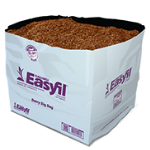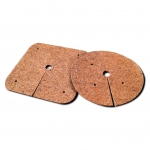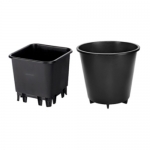
Should you grow blueberries in 100% coir substrate?
Around the world growers are moving their blueberries above ground and into substrate. While some argue that this substrate should be a blend of coir, peat and perlite, Agronomist Ronan Hoyle believes that not only can blueberries be grown in 100% coir substrate, but in 100% coir they thrive. Hoyle says “With a moderate budget and use of current day technology, growers are able to accurately fertigate and monitor blueberry crops in 100% coir, providing them better yields and improved farm productivity.”
What then do you need to factor in to make the switch to 100% coir substrate and how can you improve your blueberry crop’s potential?
Consistent Monitoring
The level of control coir provides also brings with it the requirement of consistent monitoring. To effectively manage blueberries in coir substrate you need to monitor and control three basic parameters; substrate moisture content, substrate pH and substrate EC. If not kept in check, these basic parameters can have consequences on crop productivity over consecutive years.
While it sounds like hard work, modern technology actually enables consistent monitoring in a centralised place, with control for optimisation at the touch of a button (or a few). With the right technology, checks can be easily undertaken daily and real-time, providing growers with the necessary feedback to adjust their crop inputs for maximum success.
Coir Composition
Equally important as monitoring, is the integrity of your coir substrate. For the best results it is vital that the right quality and grade of coir for blueberries be selected for the particular site they will be grown. According to Hoyle, “Your coir substrate should encompass a good balance of water holding capacity (WHC) and air-fill porosity (AFP) whilst also be free draining.”
Coir composition especially matters due to the relatively shallow root structure of blueberries. Commonly, the majority of resource seeking roots for the plant are located in the top 20-30cm of the substrate profile. This needs to be factored in the grade and composition of your coir, to ensure the chip size, fibre length and screened fines provide the necessary WHC and AFP required for crop longevity. As well as taking into consideration the capillary uptake value (CUV) and water retention efficiency (WRE) of the coir, so as to allow for optimal use of the upper substrate profile.
Blueberry Coir From Galuku
Galuku’s proven blueberry coir blends provide the correct long-term WHC and AFP, ensuring optimal growth through all stages of the crop. The success of the formulation is its ability to perform consistently year on year with minimal decomposition or reduction in AFP. In Galuku coir, your crops can be healthy and productive for 5 years or more. Plus our coir blends are readily configurable and can be tailored to site specifics, growing environment and water quality.
Container Specifications
Lastly, for greater success growing blueberries in coir substrate container choice is also important. The right container ensures substrates characteristics are not compromised, and has great bearing on the productivity of crops over many years.
According to Hoyle the “size of the container should ensure enough substrate volume for proficient root growth relevant to the crop type.” While there has been a historical belief that larger volumes of substrate mean better yields, Hoyle explains that there is no merit to this and in fact “the greater the container volume above optimal, the more difficult it is to control or steer the substrate moisture and EC.”
With less control, a less consistent root-zone environment is created, opening up more variation which can quickly have a negative impact on moisture sensitive crops like blueberries. Rather by pairing the appropriate container size to the crop type, you provide control over the 24hr moisture pattern.
Containers and bags to help you succeed
The transition from commercially growing blueberries in soil to growing in 100% Coir substrate has changed the way for many farms. With coir, many growers are able to overcome site and soil conditions and produce better yields from their crops. Whether the in ground struggle in soil pH, drainage characteristics or other challenges, crop specific coir formulation and dedicated fertigation are getting growers around the world better results.
At Galuku, we believe in partnering with growers to help you succeed. Whether you’re already growing above ground or looking to make the switch to soilless growing, we’re here to help with quality customised coir and expert technical support for every customer.
Provide better growing conditions for your crops, reduce hand weeding needs and improve the overall productivity of your farm by utilising Galuku Coconut Fibre Weed Mats.






